Highest French election turnout in 40 years as far right seeks historic win
Summary
French voters are going to the polls for the first round of a snap parliamentary election called by President Emmanuel Macron three weeks ago
At the time, President Macron said he had "heard the message" of French voters after the far-right National Rally (RN) won the European elections
The surprise announcement threw the country into turmoil as polls show the RN could become the biggest in France
President Macron's Ensemble alliance is languishing in the polls and could come third, behind RN and the left-wing coalition New National Front
Polls opened at 08:00 (06:00 GMT) and will close by 20:00 (19:00 BST)
Only candidates who manage to win more than 12.5% of the vote will go through to the next round, taking place next week on 7 July
Live Reporting
Edited by Johanna Chisholm and Laura Gozzi
- They voted far right here before, and they'll do it againpublished at 15:43
15:43
 Paul KirbyEurope digital editor in Pontault-Combault
Paul KirbyEurope digital editor in Pontault-CombaultThree weeks ago, the town of Pontault-Combault east of Paris voted for National Rally in the European elections, well ahead of any other party, so you'd think they're doing the same today.
"People want change here and they're motivated to vote," says Patrick. "They're not happy when they feel insecure on the streets." He isn't voting for the far right himself but fully expects them to win, although without an absolute majority he thinks they'll find it hard to do much.
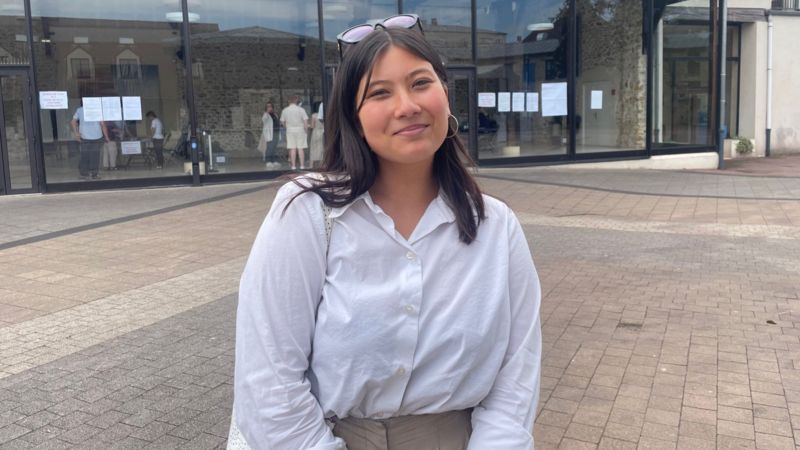 Image caption,
Image caption,As a law student, Lou is curious to see how power-sharing works
First-time voter Lou won't say how she voted but she isn't especially worried if the far right wins. "I'm a law student so I'm really interested in whether our president is capable of governing with another party," she says, pointing out that power-sharing hasn't happened in her lifetime.
Here, that's called "cohabitation" and it has not happened since 2002.
Another voter, Julien, says he'll vote for any party if they have a chance of keeping out the far right, known in French as forming a "barrage".
- 'I am sad today, even if I still have hope'published at 15:39
15:39
Marianne BaisnéeReporting from Paris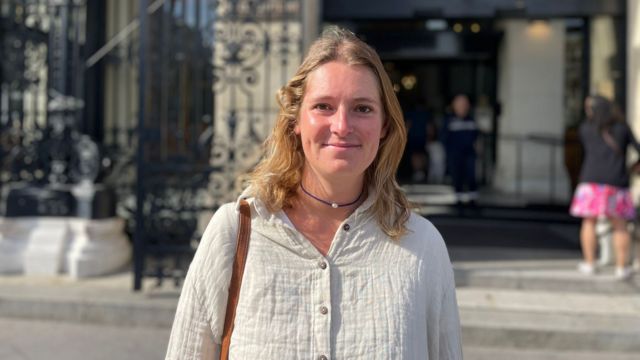
Stepping away from the polls for a moment, we're going to now bring you some of the voices from the French people who are out casting ballots in today's high-stakes election.
Claire, a 29-year-old lawyer who voted in the18th arrondissement (district) in Paris on Sunday morning.
Quote MessageIt's very important for me to vote today. The potential arrival of the far right in the government scares me very much: for me, it goes along with racism and women's rights in decline. For a country that is so mixed and being myself of dual citizenship, it is intolerable that they get a majority in parliament."
National Rally leader Jordan Bardella, more on him shortly, has said his party plans to ban dual nationals from certain sensitive jobs in security or defence.
"I am also German and it makes it even more painful to see the extreme right so close to take the power in France," Claire tells me.
"I am sad today, even if I still have hope," she says, adding that what has annoyed her most throughout this campaign is that she believes French television has given Bardella's party "far more visibility".
- Who are the main parties running today?published at 15:30
15:30
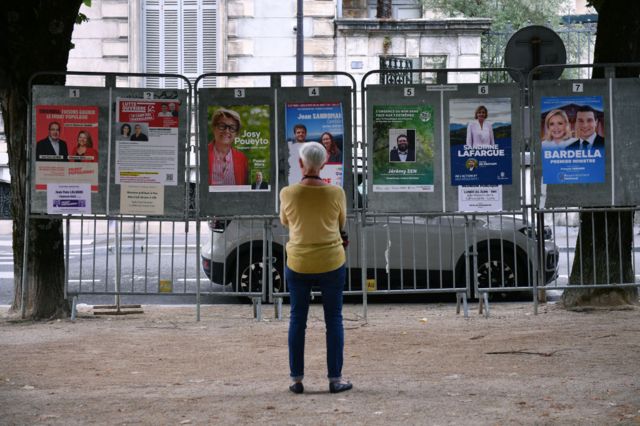 Image source, Getty Images
Image source, Getty ImagesWhile there are dozens of political parties running in the French parliamentary elections, there are three main blocks running today. These include:
- National Rally (RN): The far-right party is currently leading the polls, after a strong showing in recent European elections. While the party has moved away from the antisemitic and extremist roots of its founders, it remains strictly anti-immigration – if the party wins power it wants to get rid of the automatic right to French citizenship for children with foreign-born parents, for instance
- New Popular Front alliance: Behind RN in the polls is a group of left-wing parties – Socialists, Communists, Greens, and France Unbowed (LFI) – who decided to group together to keep the far right out of government. The alliance wants to remove the unpopular pension reforms passed by the current government, raise the minimum wage and create a rescue agency for undocumented migrants
- French President Emmanuel Macron’s Ensemble alliance: They’re trying to appeal to the centre ground, but polls suggest voters are moving strongly away from the current government to the left and the right. Some political experts think there is a real risk for that, and believe it is possible many of the Macron camp candidates will not qualify at all for the run-off vote on 7 July
- France witnesses highest voter turnout in 40 yearspublished at 15:01
15:01
 Alexandra FouchéLive reporter
Alexandra FouchéLive reporter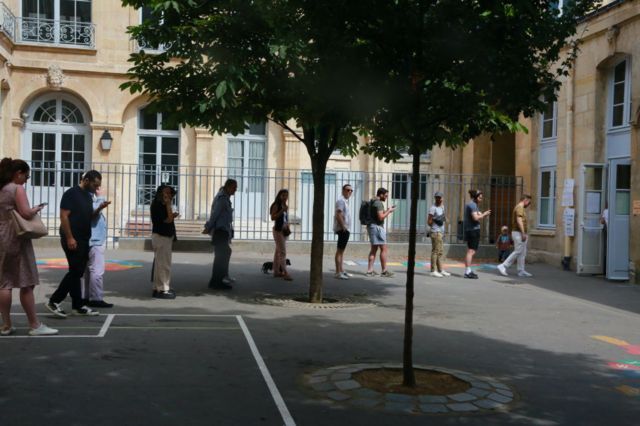 Image source, gettImage caption,
Image source, gettImage caption,People queue to cast their vote in Paris
Turnout has so far been higher than expected and seems to be bucking the trend of recent years.
By midday, it was 26% - the highest in more than 40 years.
That's an increase from the 2022 parliamentary elections. At this point in the day during that poll, only 18.43% had been recorded.
"This is the highest level since the 1981 legislative elections," Mathieu Gallard, research director at the Ipsos polling institute, said on X, external.
This was particularly striking in the capital, Paris, where turnout at midday stood at 25.48% compared to 12.8% at the same time in 2022 - that is to say a rate twice as high, French media report.
This reflects the stakes in an election that could ultimately see one of the European Union's top two powers led by a government of the populist right.
- Parliamentary and presidential elections are now out of syncpublished at 14:48
14:48
France has a semi-presidential system of government, with both a president and a prime minister handling the international and domestic affairs of the country.
As a reminder, the prime minister is the head of government, and the president is the head of state.
But since 2002, parliamentary elections have taken place right after presidential elections.
By calling these elections three years ahead of the scheduled 2027 elections, Emmanuel Macron has put the legislative term out of sync with the presidential terms.
The two elections can be realigned again if the next president in 2027 decides to dissolve parliament as soon as they are elected.
- France’s exceptionally high-stakes election has begunpublished at 14:32
14:32
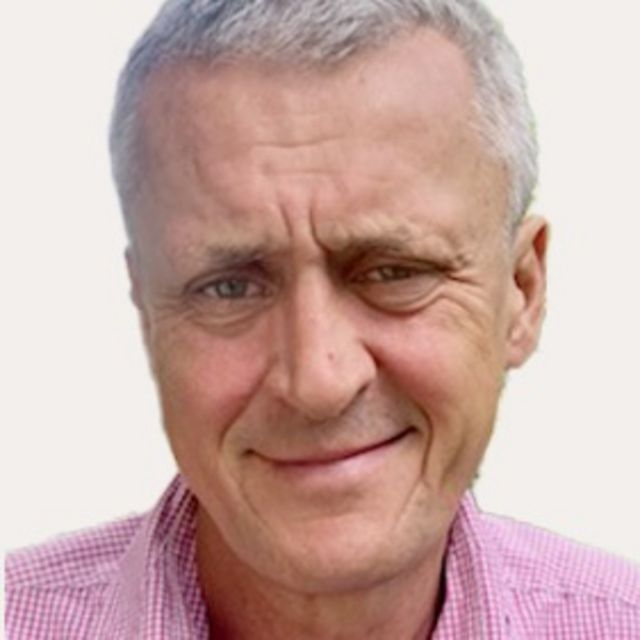 Hugh SchofieldReporting from Paris
Hugh SchofieldReporting from ParisThe result of this election could mark a historic turning point, not just for France, but for Europe and the so-called West in general.
The notion that a far-right party with roots in antisemitism and war-time collaboration could end up forming a government in a country as important as France would until very recently have been unthinkable.
That it is now not just conceivable but likely is proof that we have moved definitively out of the post-World War Two era.
Words that once were automatic signifiers of praise and blame - Gaullism, fascism, Vichy, the Republican Front - are still thrown out in political discourse. But they have less and less meaning.
Today, people class the world according to different categories. It explains why the shame attached to voting for a populist far-right party like the National Rally has all but disappeared.
- When and why did Macron call an election?published at 14:12
14:12
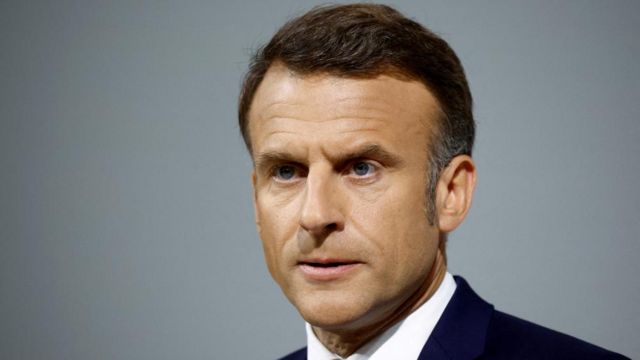 Image source, Reuters
Image source, ReutersAs we start to cover what is expected to be a rather tense first round, it's worth taking a step back to remind why this snap election was called in the first place.
Earlier this month, Emmanuel Macron made his surprise announcement in a dramatic TV address on 9 June - the day the French had taken part in European elections. It came barely an hour after polls showed the far-right National Rally party had trounced his centrist alliance.
Saying he couldn’t act as if nothing had happened, he called snap parliamentary elections. Macron’s own job isn’t affected, as these elections are separate from the presidential vote and his term runs for three more years.
Although the decision was a huge surprise, some commentators have argued Macron had no choice. Since he failed to secure an absolute majority at the last elections two years ago, he has been stuck in terms of passing new laws or reforms.
His own popularity is low, too, and his Ensemble alliance is running third in the polls. At best, he can hope to limit the damage and keep half his MPs.
Macron said he was “responding” to the people and giving them the chance to bring about clarity – even if that means giving the RN the chance to govern.
- What is happening today?published at 14:03
14:03
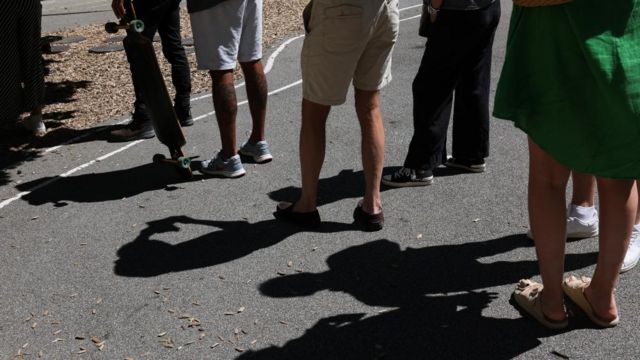 Image source, Reuters
Image source, ReutersFrench voters are going to the polls for the first round of a snap parliamentary election called by President Emmanuel Macron three weeks ago.
They are voting to elect 577 deputies of the Assemblée Nationale - the French parliament.
For an absolute majority a party needs 289 seats. The first round eliminates all candidates who fail to win the support of 12.5% of locally registered voters.
Anyone who scores 50% of the vote with a turnout of at least a quarter of the local electorate wins automatically.
Usually, that only happens in a handful of constituencies, but the favourites in this race, the far-right National Rally, are hoping for dozens of immediate victories.
As a reminder, run-offs will be taking place in a week’s time - on Sunday 7 July.
- Bienvenue!published at 13:57
13:57
 Alexandra FouchéLive reporter
Alexandra FouchéLive reporter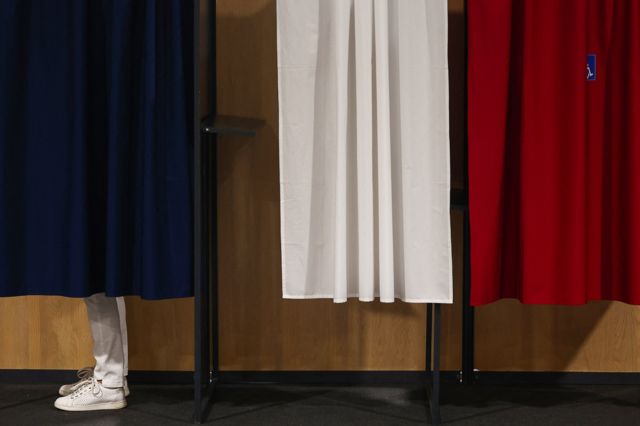 Image source, Reuters
Image source, ReutersGood afternoon and welcome to our live coverage of the first round of the French parliamentary elections.
The country has begun casting ballots in a parliamentary election that could make history, with the far right hoping to secure power after President Emmanuel Macron called a snap poll following disastrous results in the recent European elections.
A high turnout is expected among 49 million voters. Polls close in the big cities at 20:00 (19:00 BST), when the first exit polls come out.
Stay with us as we bring you updates and analysis throughout the day.
